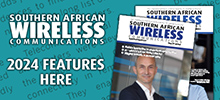06 March 2019
Modernising regulation and policy reform will be crucial to boosting Nigeria’s digital economy and boosting mobile broadband penetration, according to the GSMA.
Speaking after an event held in conjunction with the Nigerian Communications Commission at the end of last November, the GSMA’s sub-Saharan Africa head Akinwale Goodluck said: “For Nigeria to take full advantage of the next phase of its digital transformation, it’s vital that collaboration between industry and government enables the right policy environment for millions to benefit from ultra-fast mobile broadband.
“If policies don’t keep pace with the needs of society and technological innovation, there is a risk that citizens will be left behind and productivity and competitiveness will suffer.”
In its Spotlight on Nigeria: Delivering a Digital Future report, the GSMA said the mobile industry contributed USD21bn to Nigeria’s GDP in 2017, representing 5.5 per cent of the total. In addition, it said the growth of the country’s digital economy resulted in the creation of nearly 500,000 direct and indirect jobs.
The association’s research also found that smartphone adoption in Nigeria has risen to more than 53 million connections.
Forty-nine per cent of the population is currently connected by mobile technology, compared to less than one per cent who have a fixed-line.
With increased spectrum harmonisation and licensing reform, Nigerian mobile penetration is forecast to rise to 55 per cent by 2025, with 70 per cent having 3G connectivity and 17 per cent having 4G access.
Currently, only 44 per cent and four per cent of mobile subscribers in the country are using 3G and 4G, respectively.
That’s compared to more than 18 per cent 4G penetration in South Africa and 16 per cent in Angola.
The report therefore concludes that there is still broad scope for Nigeria to increase its mobile penetration.
For instance, the GSMA believes the harmonisation of the 1427-1518MHz and 3.3-3.6GHz spectrum bands makes them “critically important” for mobile operators seeking to offer new mobile services to consumers and businesses.
It said: “Making these bands available for assignment to mobile operators will be a core component in reinforcing Nigeria’s position as Africa’s leading mobile market.”
The association also reckons Nigeria’s active participation in the ITU World Radiocommunication Conference 2019 process will prove “hugely influential”.
It said: “With a year to go until WRC-19, leading the region in support of identifying new IMT bands that 5G will benefit from, especially the 26GHz, 40GHz and 70GHz bands, will be crucial.”
The association continued by saying that changes in the market and technologies have resulted in a licensing framework and licensing conditions in Nigeria that could benefit from a review and update. Building on the progress already achieved by the NCC, the GSMA report recommends the following reforms:
•Retire the Digital Mobile License, the National Carrier License and the International Gateway License
•Eliminate superseded conditions in the Unified Access Service License (UASL), and migrate many others towards a supplementary general UASL conditions document or to parallel regulations
•Transition to an indefinite duration for the UASL
•Guarantee a true unified approach to licensing, permitting licensees to offer the full range of services, as per the UASL scope of services provision
•Provide coverage obligations via radio frequency licenses
According to the GSMA, a “future-fit” licensing regime will help promote market growth, boost investor confidence and enable increased connectivity.
Left as is, it warns that Nigeria’s current licensing framework and conditions could pose an “impediment” to future growth.







